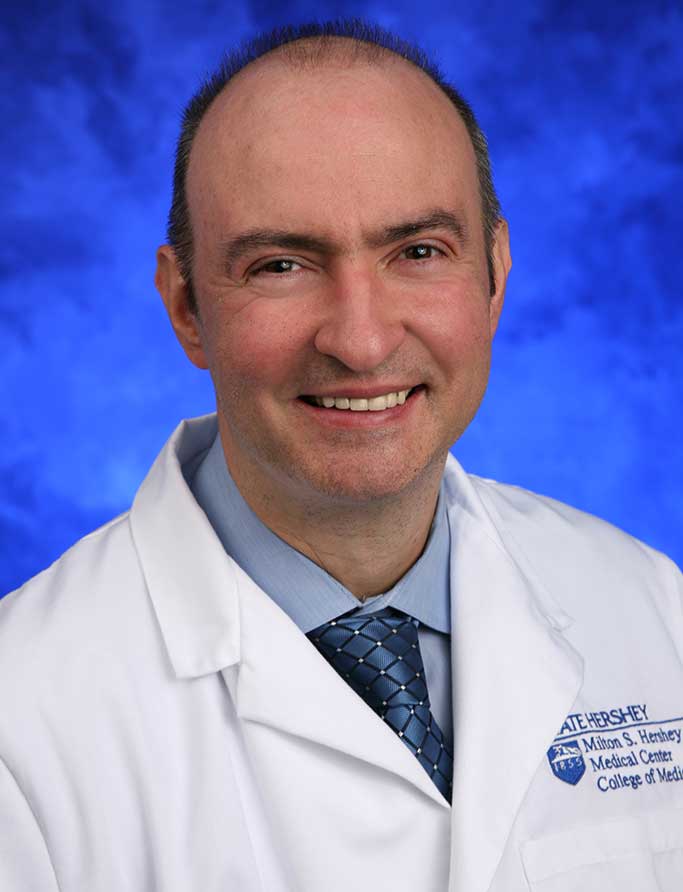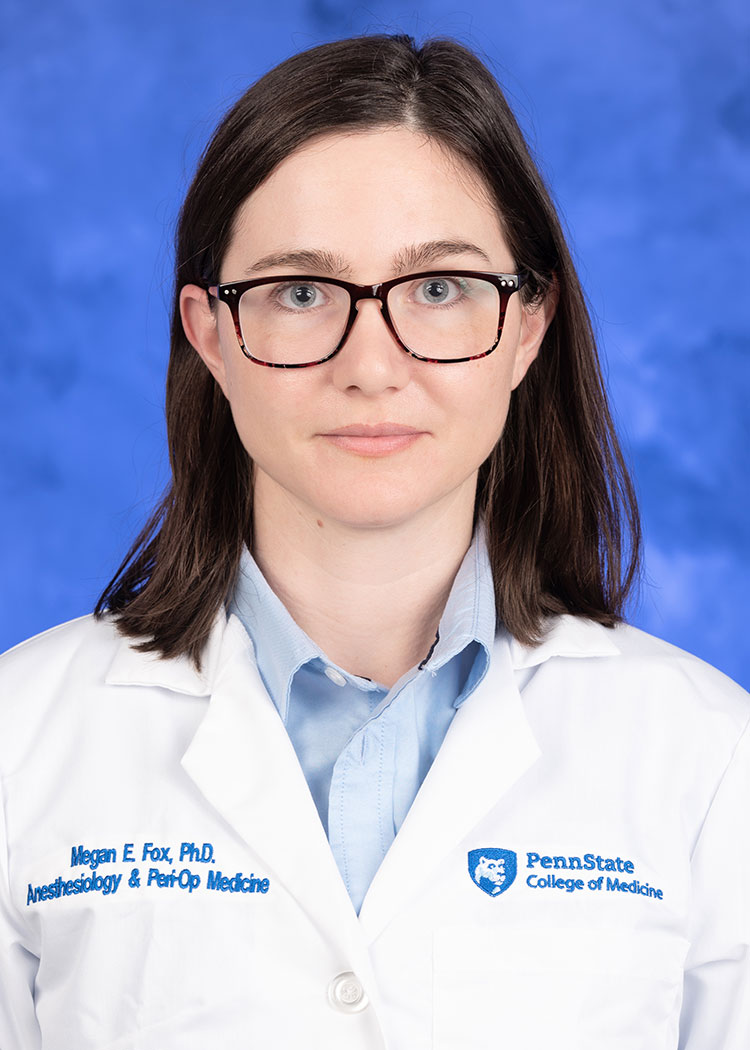 Penn State College of Medicine campus
Penn State College of Medicine campus
Penn State College of Medicine researchers have broken the college’s record for total research funding received in a year. They obtained a total of $159.8 million in total research awards during fiscal year 2023, which will allow faculty to use artificial intelligence, bioinformatics, advanced imaging and other techniques to improve health in rural communities, address health disparities and develop therapeutics and diagnostics for conditions like cancer and neurodegenerative diseases.
September 6, 2023
The total includes more than $70 million in awards from the National Institutes of Health (NIH), and secures the college’s position as the top research-funded college at Penn State for the third consecutive year.
“I am exceptionally proud of our investigators, staff and trainees for achieving this record‑breaking amount of funding support,” said Leslie Parent, MD, vice dean for research and graduate studies. “While this milestone is truly exciting, our research impact is much more than a dollar amount. Ultimately, it’s about the impact we are having on human health. These awards will help us investigate cancer, neurological disease, health disparities, substance use disorders, infectious diseases, genetics, cellular processes that influence health, and a myriad of other questions that will change the future of medicine.”
Between April and June 2023, College of Medicine researchers received 195 grants and contracts totaling $57.04 million for research. Faculty will address cardiovascular health disparities in rural areas, test a new therapeutic for brain cancers and work to understand immune responses in the contexts of pain management and inflammatory bowel disease.
Read more about eight projects below.
“Novel targeted therapy to reduce health disparities in pediatric leukemia”

Sinisa Dovoat, MD, PhD
Investigator: Sinisa Dovat, MD, PhD – professor and vice chair for basic science research, Department of Pediatrics; professor of biochemistry and molecular biology, and pharmacology
Grant amount: $541,022 ($2,705,110 anticipated through May 2028)
Awarded by: National Cancer Institute
Goal: Hispanic and Latino children and adolescents have a 40% higher death rate from B-cell acute lymphoblastic leukemia than non-Hispanic whites after correcting for socioeconomic factors. Dovat and team have identified a possible genetic mechanism behind this health disparity and will study how a novel therapeutic combination might improve treatment outcomes and reduce childhood cancer health disparities.
Read more about Dovat’s project
“Identifying multi-omic signatures of opioid use and relapse”

Megan Fox, PhD
Investigator: Megan Fox, PhD – assistant professor of anesthesiology and perioperative medicine; pharmacology
Grant amount: $498,000 ($2,490,000 anticipated through May 2028)
Awarded by: National Institute on Drug Abuse
Goal: Even after a prolonged period without opioid use, many people with opioid use disorder are at risk for relapse. Fox aims to better study the long-term molecular changes that occur in the brain during opioid use disorder that support continued drug use. By having a better understanding of these genetic and molecular changes, researchers could someday identify new treatment strategies for preventing relapse.
Read more about Fox’s project
“Mechanisms of Hepadnavirus assembly and replication”

Jianming Hu, MD, MS, PhD
Investigator: Jianming Hu, MD, PhD – professor of microbiology and immunology
Grant amount: $494,893 ($5,790,967 anticipated through August 2028)
Awarded by: National Institute of Allergy and Infectious Diseases
Goal: Hepatitis B virus (HBV) is a major cause of chronic viral hepatitis, which increases the risk of liver cancer and other end-stage liver diseases. Hu will further investigate the factors involved in disassembling the HBV nucleocapsid, or outer layer protecting the virus’ genetic material. This information could help researchers develop new antiviral treatments that target nucleocapsids.
Read more about Hu’s project
“Integrative genomic and geospatial analysis of insurance claim, biobank and GWAS summary statistics for complex traits”

Dajiang Liu, PhD, MA
Investigator: Dajiang Liu, PhD – professor and vice chair for research, Department of Public Health Sciences; professor of biochemistry and molecular biology
Grant amount: $288,010 ($2,699,207 anticipated through March 2027)
Awarded by: National Institute of Environmental Health Sciences
Goal: Human diseases like cancer, diabetes and heart disease are often jointly influenced by both genetic and environmental risk factors. Liu aims to develop advanced statistical methods to jointly analyze genetic and community-level environmental risk factors for various human health conditions using electronic health record-based biobanks. Results from this research project will lead to better strategies for preventing, diagnosing and treating diseases. Preliminary results for this project were supported by pilot funds from Penn State College of Medicine Strategic Plan Goal 2 in Artificial Intelligence and Biomedical Informatics.
Read more about Liu’s project
“Autism Services, Education, Resources and Training (ASERT) Collaborative”
Investigator: Andrea Layton, MA – Director, ASERT Collaborative
Grant amount: $21,261,956 through March 2027
Awarded by: Pennsylvania Department of Human Services
Goal: Layton will lead Penn State College of Medicine’s oversight of ASERT (Autism Services, Education, Resources and Training) — a partnership between the College of Medicine, AJ Drexel Autism Institute, and UPMC Western Behavioral Health. ASERT provides support, training and education to individuals with autism and developmental disabilities, families, professionals and the general community. The current funding is focused on justice initiatives, support for trauma, access to healthcare, emergency preparedness, transition aged youth and unserved/underserved populations.
Learn more about ASERT
“Role of biomolecular condensates in regulating HIV-1 viral ribonucleoprotein complex formation in the setting of substance use disorder”

Leslie Parent, MD
Investigator: Leslie Parent, MD – vice dean for research and graduate studies; professor of medicine, and microbiology and immunology
Grant amount: $357,328 ($717,566 anticipated through April2026)
Awarded by: National Institute of General Medical Sciences
Goal: Human immunodeficiency virus 1 (HIV-1) is an ongoing global health crisis. Studying how the virus replicates and interacts with cells will help scientists fight drug resistance and develop new treatments. The Parent laboratory is studying HIV-1 virus particle assembly in the context of substance use disorders, with the goal of fighting the HIV-1 pandemic in this vulnerable population.
Read more about Parent’s project
“Cell adhesion regulation of planar cell polarity during epidermal development”

Sarah Stahley, PhD
Investigator: Sara Stahley, PhD – assistant professor of dermatology, and cellular and molecular physiology
Grant amount: $55,000
Awarded by: Dermatology Foundation
Goal: Stahley seeks to better understand the fundamental biology behind skin development, patterning and maintenance. To do this, the team will study cell-to-cell junctions and coordination using advanced imaging techniques. Understanding how these junctions are disrupted during disease will help researchers develop new treatment and prevention strategies for diseases of the skin and other organs.
“Structural characterization of native HBV capsids and virions from human cells”
Investigator: Che-Yen “Joseph” Wang, PhD – assistant professor of microbiology and immunology
Grant amount: $728,019 ($3,496,375 anticipated through June 2028)
Awarded by: National Institute of Allergy and Infectious Diseases
Goal: Hepatitis B virus (HBV) is causes more than 257 million infections worldwide and can increase risk for liver cancer or other end-stage liver diseases. Wang will use advanced microscopy techniques to better study the structure of HBV, to gain a better understanding of how it causes disease – with the ultimate goal of identifying potential therapeutic targets.
Read more about Wang’s project
Other awards
- See grant highlights from previous months here.
- See details on grants awarded to the College of Medicine from 2017 to present here.
